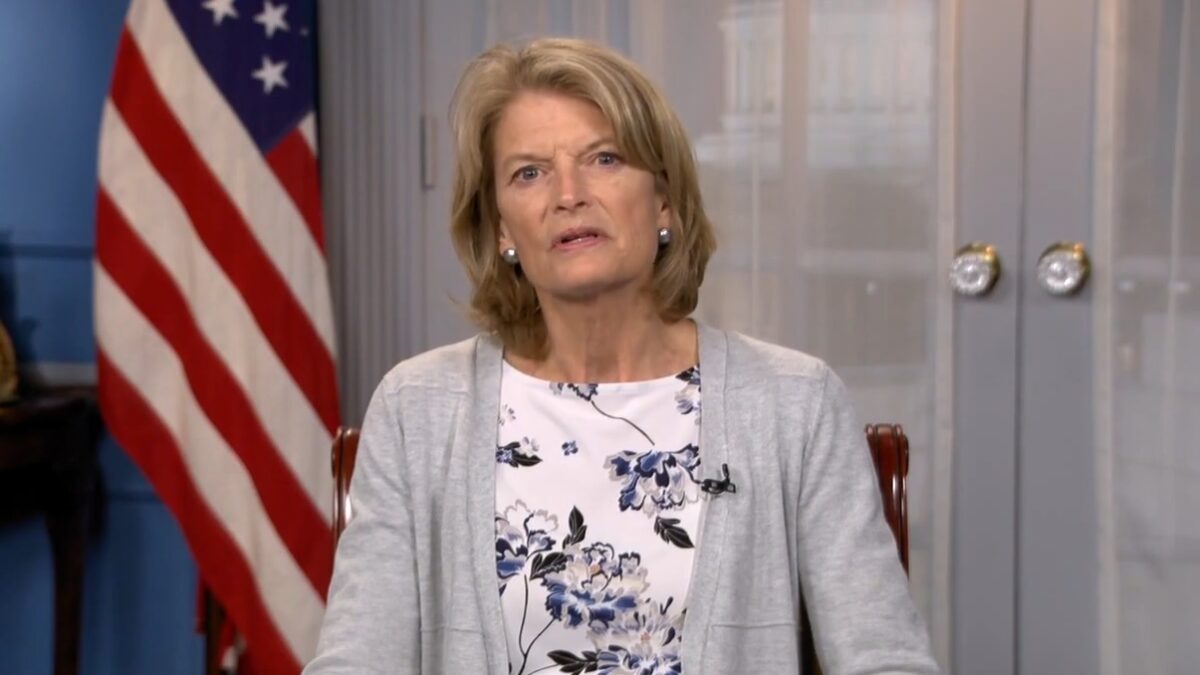In a campaign ad announcing her bid for re-election, Alaska Republican Sen. Lisa Murkowski branded her opposition from the right as an effort among D.C. partisans to buy the state’s Senate seat.
“In this election, Lower 48 outsiders are going to try to grab Alaska’s Senate seat for their partisan agendas,” Murkowski said. “They don’t understand our state, and frankly, they couldn’t care less about your future.”
An honest examination of the incumbent’s finances seven months into the race, however, reveals that, if anyone’s, it’s Murkowski whose loyalty is being purchased. According to public campaign finance data compiled by OpenSecrets, nearly 85 percent of the senator’s contributions have come from out of state. Only 15 percent came from Alaskan residents in the current election cycle.
In contrast, Murkowski’s Donald Trump-endorsed primary challenger Kelly Tshibaka, who previously served as a commissioner in the Alaska Department of Administration, is funded by an even split of in- and out-of-state contributions.
Tshibaka, whose campaign has been blessed by the state party, has raised more than $2.5 million to unseat a three-term incumbent. Tshibaka is also far more reliant on small-dollar donors compared to her opponent, who is the descendent of a political dynasty. Murkowski inherited the seat held by her senator father, Frank, when he became governor and appointed her in 2002.
Nearly 30 percent of Tshibaka’s contributions have come from small individual donations of less than $200, according to OpenSecrets. Murkowski, who’s raised more than $5 million to protect her incumbent status, is financed by large contributions from individuals and political action committees (PACs) providing more than 89 percent of her funding. Less than 5 percent have come from small individual contributions.
A major super PAC supporting Murkowski also appears to be funneling money from the Lower 48 into the Alaskan contest under the guise of resident leadership, even as the incumbent lawmaker opened her campaign with a condemnation of outside influence.
Aside from closely skirting laws that forbid naming a super PAC after the candidate, “Alaskans for L.I.S.A. (Leadership In a Strong Alaska),” has served as a primary vehicle for out-of-state interests to keep Murkowski in Washington. While its leadership consists of political operatives who’ve worked for Murkowski, public filings with the Federal Election Commission (FEC) reveal its 11 contributions to date totaling nearly $1.3 million have all come from the Lower 48.
“It’s so typical [for] Murkowski that ‘Alaskans for Lisa Murkowski’ is completely funded by people from the Lower 48,” Tshibaka told The Federalist. “Murkowski turned her back on Alaska a long time ago, but she continues to pretend to still represent us. Instead, she’s a reliable vote for the D.C. insiders who fund her campaign.”
Murkowski has pitched her time in Washington as a bipartisan lawmaker often reaching across the aisle to secure federal favors for Alaskans as a reason to keep her in the upper chamber for six more years. The senator’s efforts, however, have only yielded detrimental results for constituents handicapped by more Washington regulation while Democratic partisans benefit from another Republican lawmaker eager to serve as a foil against her own party.
Perhaps no other vote in her latest term has been more consequential than Murkowski’s approval for President Joe Biden’s pick to lead the Department of the Interior last spring, Secretary Deb Haaland. In explaining her controversial vote last year, Murkowski expressed regret for a vote to approve President Barack Obama’s choice for the nation’s pre-eminent land agency nearly 10 years ago, Secretary Sally Jewel.
“I voted for a secretary who promised to be a good partner for Alaska, but proved to be anything but that after confirmation,” Murkowski said in a press release. “So I struggled with this vote.”
Her support for Haaland, a left-wing environmentalist who served one term in Congress a decade later, would prove no better.
Projects Murkowski staked out her legacy on in the upper chamber are no closer to moving forward. On the contrary, efforts to sustainably develop in King Cove, the Tongass National Forest, the Arctic National Wildlife Refuge, and the National Petroleum Reserve have each faced added obstacles under Haaland’s leadership governing the state more than 4,000 miles away in Washington.
More than 60 percent of Alaskan land remains under the oversight of the federal government, a federal government with no plans to allow local residents to harvest their own resources. Those resources include lucrative oil and gas reserves across the north slope with much of the critical infrastructure already in place at a time the nation desperately needs to ramp up production, but is prevented by Democrats, who get support from Republicans like Murkowski.
It’s not just support for Haaland that Democrats scored from the Republican senator, who cast a tie-breaking vote to move the nomination out of the Senate Energy and Natural Resources Committee. Murkowski was also one of three Republicans to confirm President Biden’s controversial Supreme Court nominee, Justice Ketanji Brown Jackson, despite a long record of extreme leniency for those convicted of child sex crimes. Months prior, Murkowski was the sole Republican vote for Democrats’ electoral power grab that would overturn state election laws.









